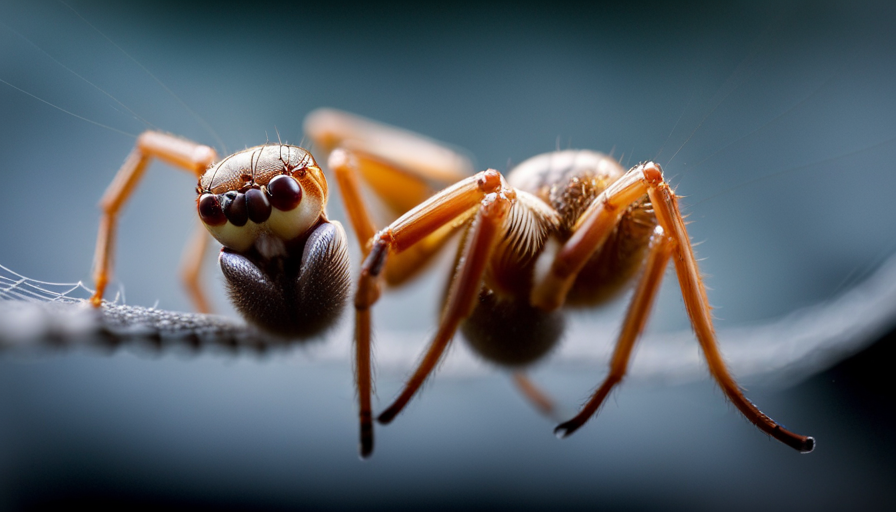While lounging in my cozy living room, I can’t help but notice the small black insects scurrying across the floor. They appear like miniature shadows, darting in and out of sight, piquing my curiosity about their origins and species.
These mysterious creatures may be small, but their presence can be quite unsettling. If you’ve ever experienced this phenomenon in your own home, you’re not alone. Small black bugs are a common nuisance that many homeowners encounter.
In this article, we will delve into the world of these tiny intruders. We will explore the different types of small black bugs that may infest your house, learn how to identify them, discuss the potential risks they pose, and provide prevention tips to keep them at bay.
Additionally, we will explore natural remedies and professional pest control options to help you rid your home of these unwelcome guests once and for all.
So, let’s dive into the fascinating world of these tiny black bugs and discover how to reclaim our homes from their clutches.
Key Takeaways
- Small black bugs in the house can include carpet beetles, gnats, fruit flies, and ants.
- These bugs are attracted to moisture and can cause damage to fabrics, carpets, stored food, and invade homes in search of food.
- Natural remedies like essential oils can be used as insect repellents, and regular cleaning and decluttering can help prevent bug infestations.
- Sealing cracks and openings, proper food storage, and professional pest control may be necessary for effective prevention and elimination of small black bugs.
Common Types of Small Black Bugs in the House
Have you ever wondered what those pesky little black bugs crawling around your house are? Identifying black bug infestations can be a challenging task, but understanding the common types of small black bugs found in homes can help.
These bugs are often attracted to areas with moisture, such as bathrooms and kitchens. They can be found crawling on walls, floors, and even inside food containers.
One common type of small black bug is the carpet beetle. They’re tiny insects with a black or dark brown body and are known to cause damage to fabrics, carpets, and stored food. Another type is the black carpet beetle, which is similar in appearance but has a more rounded shape. These beetles can chew through fibers and cause significant damage to clothing and furniture.
Other common black bugs found in houses include gnats, fruit flies, and ants. Gnats and fruit flies are small flying insects that are attracted to ripe fruits and vegetables. They can be a nuisance, especially in the kitchen. Ants are social insects that often invade homes in search of food. They can be identified by their small size, black color, and organized trails.
Identifying small black bugs in your house is crucial to prevent further damage. Signs of black bug damage may include holes in fabrics, carpet damage, or the presence of trails or nests. By understanding the types of bugs commonly found in homes, you can take appropriate measures to control and eliminate their infestations.
Now let’s move on to identifying these small black bugs in more detail.
Identifying Small Black Bugs
Although they may be difficult to see, there are small black bugs that can often be found in homes. Identifying these tiny insects can be helpful in determining the best pest control methods.
One common type of small black bug is the carpet beetle. These bugs are oval-shaped and have a dark black color. They can be found in carpets, upholstery, and clothing, and are known to cause damage to these materials.
Another type of small black bug is the fruit fly. These insects are attracted to ripe fruits and vegetables and can easily infest kitchens and pantries.
Other small black bugs include the black carpet beetle, which feeds on natural fibers like wool and silk, and the fungus gnat, which is commonly found in damp areas.
When dealing with small black bugs in the house, it’s important to consider natural insect repellents. These can be effective alternatives to chemical-based pesticides. Some natural repellents include essential oils such as peppermint, lavender, and eucalyptus. These oils can be mixed with water and sprayed around the infested areas.
Additionally, keeping a clean and organized home can help prevent the infestation of small black bugs. By removing sources of food and moisture, such as spilled food and standing water, you can reduce the likelihood of bugs appearing.
Understanding the identification and control methods for small black bugs can help prevent potential risks and damage caused by these pests. By taking proactive measures and using natural insect repellents, homeowners can effectively manage and eliminate small black bug infestations.
Potential Risks and Damage Caused by Small Black Bugs
Watch out for the potential risks and damage caused by these pesky little critters infesting your home. Small black bugs may seem harmless, but they can pose various risks associated with health concerns. Here are some important things to consider:
- Contamination: These bugs can contaminate your food and surfaces with their feces, saliva, and shed skin, leading to potential health risks such as food poisoning and allergic reactions.
- Structural damage: Some small black bugs, like termites and carpenter ants, can cause significant damage to the structure of your home. They chew through wood, weakening the foundation and potentially leading to costly repairs.
- Disease transmission: Certain bugs, like fleas and ticks, can carry diseases that can be transmitted to humans and pets. Lyme disease, for example, is transmitted by black-legged ticks and can have serious health consequences if left untreated.
- Infestation spread: If left unchecked, small black bugs can quickly multiply and spread throughout your home, making it difficult to eradicate them completely.
It’s crucial to take proactive measures to prevent these bugs from infesting your home. By implementing effective prevention tips, you can keep small black bugs at bay and protect your home and health from their potential risks.
Prevention Tips to Keep Small Black Bugs Away
Regular cleaning and decluttering are essential in preventing small black bugs from infesting your home. By regularly cleaning and removing any clutter, you eliminate potential hiding places and food sources for these pests.
Proper food storage is another crucial step in keeping small black bugs away. Storing food in airtight containers and cleaning up spills promptly can help prevent these bugs from being attracted to your kitchen.
Lastly, sealing cracks and openings in your home can prevent small black bugs from entering in the first place. By sealing off potential entry points, you can create a barrier that keeps these pests out and helps maintain a bug-free environment.
Regular Cleaning and Decluttering
Make sure you clean your house every single day, or those pesky little black bugs will completely take over your entire living space! Regular cleaning and decluttering are essential in keeping these tiny creatures at bay. Not only does cleaning remove any food sources that might attract the bugs, but it also disrupts their breeding and nesting grounds. To effectively combat these pests, it is important to develop a cleaning routine that includes vacuuming, sweeping, and mopping all areas of your home. Additionally, decluttering and organizing spaces can eliminate hiding spots for the bugs, making it easier to spot and eradicate them. Remember, a clean and organized home is less appealing to these unwanted visitors. Transitioning into the next section about proper food storage, it is crucial to understand how to prevent these bugs from infesting your pantry and kitchen.
Proper Food Storage
To keep those unwanted visitors out of your kitchen, it’s important to store your food properly. Proper food storage organization and pantry maintenance are crucial in preventing tiny black bugs from infesting your home.
Start by organizing your pantry, keeping similar items together and using clear containers to easily identify the contents. This not only helps with inventory management but also reduces the chances of attracting pests. Make sure to check expiration dates regularly and discard any expired or spoiled food.
Additionally, keep your pantry clean by wiping down shelves and vacuuming any crumbs or spills. By maintaining a clean and organized pantry, you can minimize the risk of attracting tiny black bugs.
Now, let’s move on to sealing cracks and openings in your home to further protect against these pests.
Sealing Cracks and Openings
To continue protecting your home from those pesky tiny black bugs, it is important to address any cracks and openings that may serve as entry points. Sealing these gaps not only prevents the bugs from entering your house, but also helps with weatherproofing your windows. Weatherproofing ensures that your windows are tightly sealed, preventing drafts and reducing energy loss.
One effective method for sealing cracks and openings is by using caulk. Caulk can be used to fill in small cracks and gaps, creating a barrier that bugs cannot penetrate. Additionally, installing weatherstripping around your windows and doors can further reinforce the seal and keep bugs out.
By properly sealing these openings, you are taking a proactive approach to pest control. It is an essential step in creating a bug-free environment in your home. Now, let’s explore natural remedies for getting rid of these small black bugs.
Natural Remedies for Getting Rid of Small Black Bugs
Using natural remedies can be like sending an army of warriors to battle against those pesky small black bugs invading your house. These tiny creatures may seem harmless, but they can quickly multiply and become a nuisance.
Thankfully, there are natural insecticides and DIY bug traps that can help you get rid of them effectively.
Here are three natural remedies that can help you eliminate those small black bugs:
- Essential oils: Certain essential oils, such as peppermint, tea tree, and lavender, have insect-repellent properties. Mix a few drops of these oils with water and spray the solution around areas where you frequently spot the bugs. The strong scent will deter them from entering your home.
- Diatomaceous earth: This natural powder is made from fossilized remains of tiny aquatic organisms. It works by dehydrating the bugs, ultimately leading to their demise. Sprinkle diatomaceous earth around cracks, crevices, and other bug entry points to create a barrier they cannot cross.
- Homemade bug traps: Create your own DIY bug traps using ingredients like sugar, vinegar, and dish soap. The sweet scent of sugar attracts the bugs, while the vinegar and dish soap create a sticky trap that captures them.
By incorporating these natural remedies into your battle plan, you can take control of the situation and eliminate those small black bugs from your house. However, if the infestation persists, it may be time to consider professional pest control options.
Professional Pest Control Options
If the invasion of those pesky creatures continues, it might be time to enlist the help of professional pest control options. While natural remedies can be effective in controlling small black bugs, sometimes the infestation becomes too severe to manage on your own. Professional pest removal services have access to powerful insecticides that can effectively eliminate these tiny black bugs from your home.
When it comes to choosing the right professional pest control option, it’s important to consider the severity of the infestation, the type of bugs you’re dealing with, and the potential risks to your health and the environment. A reputable pest control company will conduct a thorough inspection of your home to identify the source of the infestation and develop a customized treatment plan.
Insecticides are commonly used by professional pest control services to eradicate small black bugs. These chemicals are designed to target and kill the pests while minimizing harm to humans and pets. Effective insecticides contain ingredients such as pyrethroids or neonicotinoids, which disrupt the nervous system of the bugs, leading to their demise.
Here is a table outlining some common professional pest control options and their effectiveness in eliminating small black bugs:
| Pest Control Option | Effectiveness in Eliminating Small Black Bugs |
|---|---|
| Fumigation | Highly effective |
| Heat Treatment | Highly effective |
| Chemical Sprays | Moderately effective |
| Integrated Pest Control | Highly effective |
Remember, professional pest control options should always be used as a last resort when natural remedies fail to control the infestation. It’s important to work with a licensed and experienced pest control company to ensure the safety and effectiveness of the treatment.
Frequently Asked Questions
How can I identify the specific type of small black bug in my house?
To identify the specific type of small black bug in your house, carefully observe its physical characteristics such as size, shape, and any distinguishing features. Common places to find black bugs include kitchens, bathrooms, and basements.
Are small black bugs harmful to humans?
Small black bugs may pose potential health risks to humans. They can be found in common hiding spots such as cracks, crevices, and damp areas. It’s important to identify and address the issue promptly to prevent any adverse effects.
What are the potential damages caused by small black bugs in a house?
Potential damages caused by small black bugs in a house include structural damage, contamination of food and surfaces, and health risks due to bites or allergens. It is important to identify and eliminate these pests to maintain a safe and healthy living environment.
How can I prevent small black bugs from infesting my home?
To prevent small black bugs from infesting your home, use natural bug repellents like peppermint oil or vinegar. If the infestation persists, consider hiring professional pest control services for a more effective and long-term solution.
What are some natural remedies that effectively eliminate small black bugs?
Natural bug repellents and DIY bug traps are effective in eliminating small black bugs. I have found that using essential oils such as peppermint or lavender, along with homemade traps using vinegar or dish soap, can help control their population.
Conclusion
In conclusion, dealing with tiny black bugs in your house can be a frustrating experience. However, by identifying the type of bug and understanding the potential risks they pose, you can take the necessary steps to prevent their infestation.
Using natural remedies or seeking professional pest control options can help in getting rid of these pests effectively. Remember, knowledge is power when it comes to pest control, so don’t hesitate to educate yourself and take action. After all, an ounce of prevention is worth a pound of cure.
I’m Theodore, and I love tiny houses. In fact, I’m the author of Tiny House 43, a book about tiny houses that are also tree houses. I think they’re magical places where imaginations can run wild and adventures are just waiting to happen.
While tree houses are often associated with childhood, they can be the perfect adult retreat. They offer a cozy space to relax and unwind, surrounded by nature. And since they’re typically built on stilts or raised platforms, they offer stunning views that traditional homes simply can’t match.
If you’re looking for a unique and romantic getaway, a tree house tiny house might just be the perfect option.










